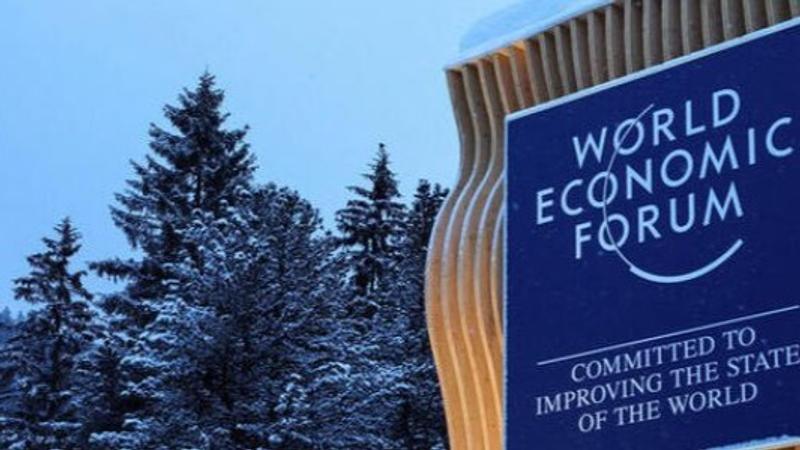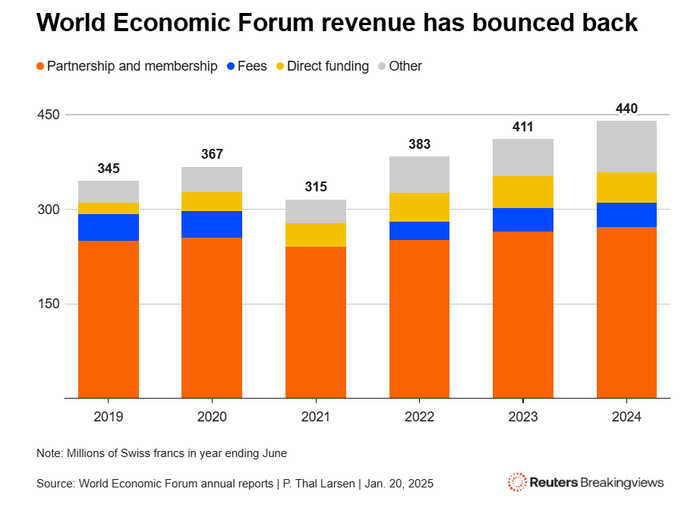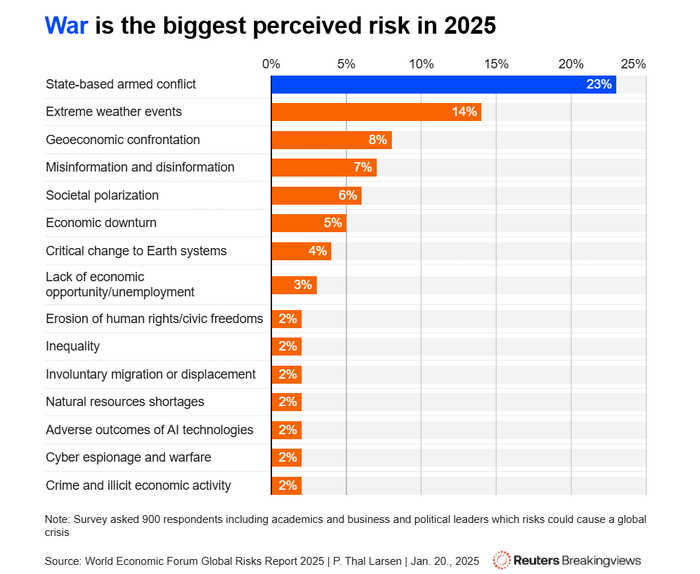Published 12:53 IST, January 21st 2025
Davos Becomes World’s Most Exclusive Watch Party
The World Economic Forum (WEF) in Davos this week focuses on US President Trump's return to office, as global leaders track his policy moves.

The Swiss town of Davos will this week host what amounts to an exclusive watch party for the season premiere of Donald Trump’s second term. The annual gathering of the World Economic Forum (WEF), held in the alpine resort each January, presents itself as a place where the world’s political, business, and financial leaders meet to solve big problems. This year, though, the 2,750 delegates will spend most of their time monitoring the U.S. president’s return to the White House.
In many ways, the conflab started by Klaus Schwab more than five decades ago is a testament to the global jet set’s enduring desire to rub shoulders. Irrespective of developments in communications technology – and growing awareness of the environmental cost of long-distance travel – thousands of politicians, executives, investors, bureaucrats, and journalists make the yearly trip to the Swiss alps. Once there, they’ll squeeze into overheated conference rooms and crowded cocktail parties to discuss corporate deals, the conflicts in Ukraine and Gaza, and the latest developments in artificial intelligence.
The gathering has proved remarkably resilient to the backlash against global elites exemplified by Trump’s first electoral victory in 2016. Baseless online conspiracy theories, and public antipathy to the creature known as “Davos Man”, have so far failed to dent the WEF’s allure. In the year to June 2024, the organisation pulled in revenue of almost 440 million Swiss francs – a quarter more than in 2019.
This week, however, the snow-booted delegates’ attention will be fixed on one man almost 7,000 kilometres away. Trump is due to be sworn in at the United States Capitol on Monday, after which he intends to issue a flurry of executive orders and directives ranging from energy to immigration, two sources familiar with the planning told Reuters last week.
These moves could shake financial markets and change the fortunes of economies, industries, and companies around the world. Financiers and corporate executives, many of whom have so far discounted the president’s promises of blanket tariffs and mass deportations as campaign rhetoric, will be glued to their screens as the policy details trickle through. The former reality-TV host is set to reinforce the spectacle by making a virtual appearance in front of the Davos crowd on Thursday.
The schedule clash has forced corporate chieftains to make revealing choices. Microsoft boss Satya Nadella, JPMorgan’s Jamie Dimon and BlackRock’s Larry Fink are due to appear in Davos. However, Trump’s inauguration is the bigger draw for others. The heads of five of the “Magnificent Seven” U.S. tech giants will attend the president’s swearing-in ceremony: Amazon Executive Chair Jeff Bezos, Tesla boss Elon Musk, Meta Platforms’ founder Mark Zuckerberg, Tim Cook of Apple and Alphabet’s Sundar Pichai.
Davos is also facing a relative dearth of political leaders. Chinese President Xi Jinping is staying away, as is Indian Prime Minister Narendra Modi . The only elected leader from the Group of Seven developed economies taking the Davos stage is Germany’s Olaf Scholz, whose party is on course to lose the country’s general election next month, according to opinion polls.
The disappointing guest list reinforces a growing sense among the Davos crowd that the world is drifting ever-further away from the WEF’s pro-trade, internationalist spirit. The United States has become an increasingly aggressive user of financial sanctions and export controls against its adversaries, including Russia and China. Just last week, the outgoing administration of President Joe Biden imposed restrictions on exports of artificial intelligence chips to all but 18 approved countries, prompting protests from tech giants such as Nvidia and Oracle.
Meanwhile, vast industrial subsidies – such as those doled out by Biden’s Inflation Reduction Act – have spurred competition between countries to attract investments and manufacturing facilities. Trump’s threatened blanket import tariffs would further scramble global supply chains.
The Davos set seems pessimistic. Among the experts polled by the WEF for its annual survey of global risks, 23% identified “state-based armed conflict” as the biggest danger facing the world this year, well ahead of threats like extreme weather events, misinformation and pandemics. Trump’s pre-inauguration musings about the U.S. annexing Greenland and reclaiming the Panama Canal reinforce those concerns, and jar with the cuddly title for this year’s meeting: “Collaboration for the Intelligent Age”. More than ever, attendees may wonder whether Davos has outlived its purpose.

Admittedly, the WEF has reinvented itself in the past. After the 2008 financial crisis discredited Western capitalism, Schwab wooed prominent delegates from emerging markets like India, China, and South Africa. The organisation even managed to co-opt Trump, who twice made the trip to the Swiss mountains during his first term.
However, the WEF faces its own succession questions. Last year, the 86-year-old Schwab said he would hand over executive responsibilities. In theory, that clears the path for a new leader to rethink Davos’ purpose in today’s more fractious political and economic era. For now, though, such questions will be entirely overshadowed by the small-screen drama playing out in Washington, six time zones away.
Updated 15:18 IST, January 21st 2025